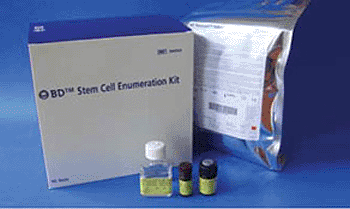Flow Cytometry Stem Cell Enumeration Kit Designed to Ease Stem Cell Transplantation
|
By LabMedica International staff writers Posted on 07 Mar 2012 |

Image: The BD Stem Cell Enumeration (SCE) Kit (Photo courtesy of BD Biosciences).
A dedicated flow cytometry stem cell enumeration kit is aimed at the rapidly growing stem cell transplantation market.
High-dose chemotherapy (HDC) with transplant is now standard therapy in multiple myeloma, acute myeloid leukemia in first remission, and intermediate-grade non-Hodgkin's lymphoma. Stem cell transplantation with cell selection is performed after HDC in an effort to restore a cancer patient’s blood and immune cell production capacity, which is destroyed in this aggressive form of cancer treatment. Improvements in transplantation techniques, including the wider use of cell selection, have also contributed to a significant reduction in the morbidity and mortality associated with conventional transplantation. As a result, HDC with transplantation has grown at an average annual rate of 21% over the past 10 years.
To aid clinicians and researchers working in the stem cell transplantation field BD Biosciences (Franklin Lakes, NJ, USA) has introduced their BD Stem Cell Enumeration (SCE) Kit for use on the BD FACSCanto II and BD FACSCalibur flow cytometers.
The SCE Kit is for in vitro diagnostic use and provides a single-tube, single-platform assay for accurate, reproducible, and rapid enumeration of CD34+ hematopoietic and progenitor cells in a wide range of stem cell sources. Sample types that may be analyzed with the SCE Kit include normal and mobilized peripheral blood, material from fresh or frozen leukophoresis, bone marrow, and cord blood.
The BD SCE assay allows simultaneous enumeration of total viable dual-positive CD45+/CD34+ hematopoietic stem cells in absolute counts of CD34+ cells/microliter and the percentage of viable leucocytes (CD45+) that are CD34-positive (CD34+). A set of premixed antibodies reduces reagent preparation time to meet productivity demands of clinical labs. In addition, the SCE assay incorporates BD’s proprietary Trucount tubes, which allow determination of absolute cell count, thereby eliminating variability associated with hematology-derived absolute counts.
Related Links:
BD Biosciences
High-dose chemotherapy (HDC) with transplant is now standard therapy in multiple myeloma, acute myeloid leukemia in first remission, and intermediate-grade non-Hodgkin's lymphoma. Stem cell transplantation with cell selection is performed after HDC in an effort to restore a cancer patient’s blood and immune cell production capacity, which is destroyed in this aggressive form of cancer treatment. Improvements in transplantation techniques, including the wider use of cell selection, have also contributed to a significant reduction in the morbidity and mortality associated with conventional transplantation. As a result, HDC with transplantation has grown at an average annual rate of 21% over the past 10 years.
To aid clinicians and researchers working in the stem cell transplantation field BD Biosciences (Franklin Lakes, NJ, USA) has introduced their BD Stem Cell Enumeration (SCE) Kit for use on the BD FACSCanto II and BD FACSCalibur flow cytometers.
The SCE Kit is for in vitro diagnostic use and provides a single-tube, single-platform assay for accurate, reproducible, and rapid enumeration of CD34+ hematopoietic and progenitor cells in a wide range of stem cell sources. Sample types that may be analyzed with the SCE Kit include normal and mobilized peripheral blood, material from fresh or frozen leukophoresis, bone marrow, and cord blood.
The BD SCE assay allows simultaneous enumeration of total viable dual-positive CD45+/CD34+ hematopoietic stem cells in absolute counts of CD34+ cells/microliter and the percentage of viable leucocytes (CD45+) that are CD34-positive (CD34+). A set of premixed antibodies reduces reagent preparation time to meet productivity demands of clinical labs. In addition, the SCE assay incorporates BD’s proprietary Trucount tubes, which allow determination of absolute cell count, thereby eliminating variability associated with hematology-derived absolute counts.
Related Links:
BD Biosciences
Latest BioResearch News
- Genome Analysis Predicts Likelihood of Neurodisability in Oxygen-Deprived Newborns
- Gene Panel Predicts Disease Progession for Patients with B-cell Lymphoma
- New Method Simplifies Preparation of Tumor Genomic DNA Libraries
- New Tool Developed for Diagnosis of Chronic HBV Infection
- Panel of Genetic Loci Accurately Predicts Risk of Developing Gout
- Disrupted TGFB Signaling Linked to Increased Cancer-Related Bacteria
- Gene Fusion Protein Proposed as Prostate Cancer Biomarker
- NIV Test to Diagnose and Monitor Vascular Complications in Diabetes
- Semen Exosome MicroRNA Proves Biomarker for Prostate Cancer
- Genetic Loci Link Plasma Lipid Levels to CVD Risk
- Newly Identified Gene Network Aids in Early Diagnosis of Autism Spectrum Disorder
- Link Confirmed between Living in Poverty and Developing Diseases
- Genomic Study Identifies Kidney Disease Loci in Type I Diabetes Patients
- Liquid Biopsy More Effective for Analyzing Tumor Drug Resistance Mutations
- New Liquid Biopsy Assay Reveals Host-Pathogen Interactions
- Method Developed for Enriching Trophoblast Population in Samples
Channels
Clinical Chemistry
view channel
New PSA-Based Prognostic Model Improves Prostate Cancer Risk Assessment
Prostate cancer is the second-leading cause of cancer death among American men, and about one in eight will be diagnosed in their lifetime. Screening relies on blood levels of prostate-specific antigen... Read more
Extracellular Vesicles Linked to Heart Failure Risk in CKD Patients
Chronic kidney disease (CKD) affects more than 1 in 7 Americans and is strongly associated with cardiovascular complications, which account for more than half of deaths among people with CKD.... Read moreMolecular Diagnostics
view channel
POC Test Uses Fingerstick Blood, Serum, Or Plasma Sample to Detect Typhoid Fever
Typhoid fever is an acute febrile illness caused by Salmonella enterica serovar Typhi (S. Typhi) and affects an estimated 11–21 million people globally each year, resulting in approximately 128,000–161,000... Read more
Rapid Testing Panel Simultaneously Detects 15 Drugs of Abuse in Urine Within 21 Minutes
Illicit drug use and excessive use of prescription medicine is growing across the US amid a severe opioid crisis. Although overdose fatalities were reported to have declined by nearly 27% in 2024, many... Read moreHematology
view channel
New Guidelines Aim to Improve AL Amyloidosis Diagnosis
Light chain (AL) amyloidosis is a rare, life-threatening bone marrow disorder in which abnormal amyloid proteins accumulate in organs. Approximately 3,260 people in the United States are diagnosed... Read more
Fast and Easy Test Could Revolutionize Blood Transfusions
Blood transfusions are a cornerstone of modern medicine, yet red blood cells can deteriorate quietly while sitting in cold storage for weeks. Although blood units have a fixed expiration date, cells from... Read more
Automated Hemostasis System Helps Labs of All Sizes Optimize Workflow
High-volume hemostasis sections must sustain rapid turnaround while managing reruns and reflex testing. Manual tube handling and preanalytical checks can strain staff time and increase opportunities for error.... Read more
High-Sensitivity Blood Test Improves Assessment of Clotting Risk in Heart Disease Patients
Blood clotting is essential for preventing bleeding, but even small imbalances can lead to serious conditions such as thrombosis or dangerous hemorrhage. In cardiovascular disease, clinicians often struggle... Read moreImmunology
view channelBlood Test Identifies Lung Cancer Patients Who Can Benefit from Immunotherapy Drug
Small cell lung cancer (SCLC) is an aggressive disease with limited treatment options, and even newly approved immunotherapies do not benefit all patients. While immunotherapy can extend survival for some,... Read more
Whole-Genome Sequencing Approach Identifies Cancer Patients Benefitting From PARP-Inhibitor Treatment
Targeted cancer therapies such as PARP inhibitors can be highly effective, but only for patients whose tumors carry specific DNA repair defects. Identifying these patients accurately remains challenging,... Read more
Ultrasensitive Liquid Biopsy Demonstrates Efficacy in Predicting Immunotherapy Response
Immunotherapy has transformed cancer treatment, but only a small proportion of patients experience lasting benefit, with response rates often remaining between 10% and 20%. Clinicians currently lack reliable... Read moreMicrobiology
view channel
Comprehensive Review Identifies Gut Microbiome Signatures Associated With Alzheimer’s Disease
Alzheimer’s disease affects approximately 6.7 million people in the United States and nearly 50 million worldwide, yet early cognitive decline remains difficult to characterize. Increasing evidence suggests... Read moreAI-Powered Platform Enables Rapid Detection of Drug-Resistant C. Auris Pathogens
Infections caused by the pathogenic yeast Candida auris pose a significant threat to hospitalized patients, particularly those with weakened immune systems or those who have invasive medical devices.... Read morePathology
view channel
Engineered Yeast Cells Enable Rapid Testing of Cancer Immunotherapy
Developing new cancer immunotherapies is a slow, costly, and high-risk process, particularly for CAR T cell treatments that must precisely recognize cancer-specific antigens. Small differences in tumor... Read more
First-Of-Its-Kind Test Identifies Autism Risk at Birth
Autism spectrum disorder is treatable, and extensive research shows that early intervention can significantly improve cognitive, social, and behavioral outcomes. Yet in the United States, the average age... Read moreTechnology
view channel
Robotic Technology Unveiled for Automated Diagnostic Blood Draws
Routine diagnostic blood collection is a high‑volume task that can strain staffing and introduce human‑dependent variability, with downstream implications for sample quality and patient experience.... Read more
ADLM Launches First-of-Its-Kind Data Science Program for Laboratory Medicine Professionals
Clinical laboratories generate billions of test results each year, creating a treasure trove of data with the potential to support more personalized testing, improve operational efficiency, and enhance patient care.... Read moreAptamer Biosensor Technology to Transform Virus Detection
Rapid and reliable virus detection is essential for controlling outbreaks, from seasonal influenza to global pandemics such as COVID-19. Conventional diagnostic methods, including cell culture, antigen... Read more
AI Models Could Predict Pre-Eclampsia and Anemia Earlier Using Routine Blood Tests
Pre-eclampsia and anemia are major contributors to maternal and child mortality worldwide, together accounting for more than half a million deaths each year and leaving millions with long-term health complications.... Read moreIndustry
view channel
WHX Labs in Dubai spotlights leadership skills shaping next-generation laboratories
WHX Labs in Dubai (formerly Medlab Middle East), held at Dubai World Trade Centre (DWTC) from 10–13 February, brings together international experts to discuss the factors redefining laboratory leadership,... Read moreNew Collaboration Brings Automated Mass Spectrometry to Routine Laboratory Testing
Mass spectrometry is a powerful analytical technique that identifies and quantifies molecules based on their mass and electrical charge. Its high selectivity, sensitivity, and accuracy make it indispensable... Read more
AI-Powered Cervical Cancer Test Set for Major Rollout in Latin America
Noul Co., a Korean company specializing in AI-based blood and cancer diagnostics, announced it will supply its intelligence (AI)-based miLab CER cervical cancer diagnostic solution to Mexico under a multi‑year... Read more



















